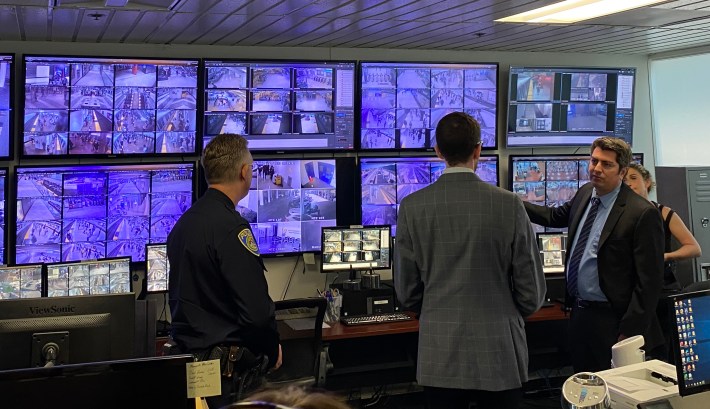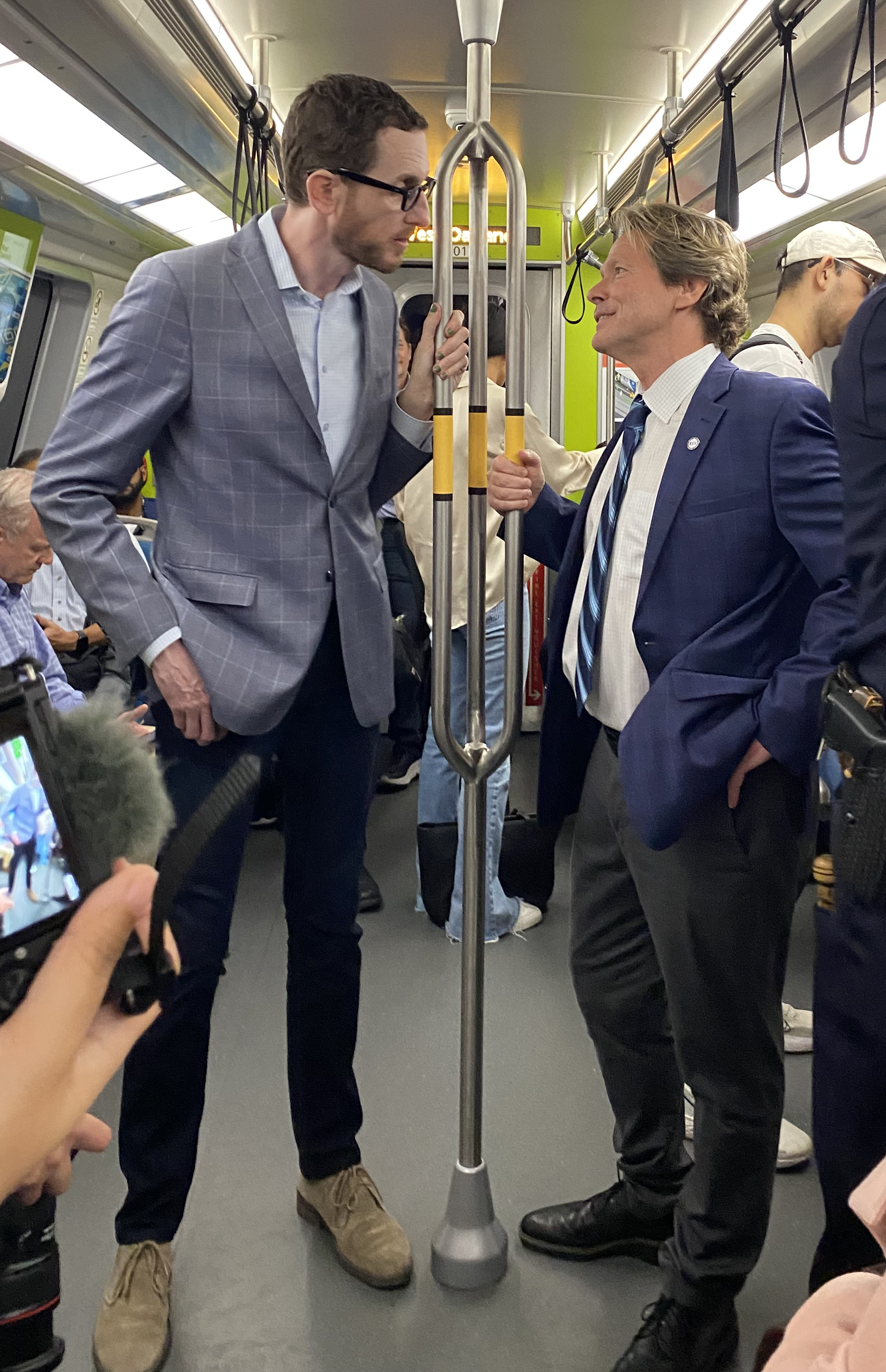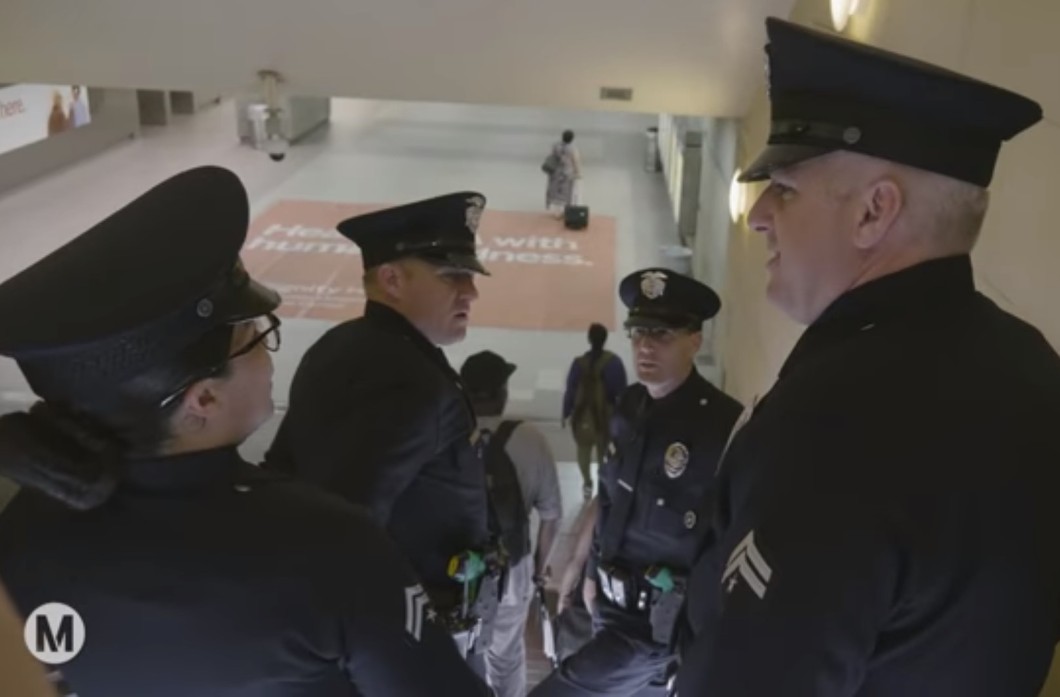Tuesday afternoon, Senator Scott Wiener and BART General Manager Robert Powers took a group of journalists on a BART ride to talk about some of the ways the agency is working to keep its riders safe and its trains clean.
The purpose of the trip was to counteract the seemingly widely-held perception that riding transit is unpleasant and dangerous. Transit ridership, and particularly BART ridership, is still only at about forty percent of its pre-pandemic levels, and that media-fed perception of danger might be one factor in the slow recovery rate.
Maybe. Current BART riders probably know that BART is about the same as it was in early 2020, with fewer riders and more new trains coming online.
That is: not perfect, but generally safe. Not pristine, but generally clean. Not crowded, but definitely well-used and relied upon by a very broad range of people.
Police officers kept an eye on the station platform for a good half hour before Wiener and Powers descended to it and rode the train into West Oakland; all the while they were surrounded by what looked like a group of paparazzi. It was hard to conduct interviews on the train, though, because even the new trains are too loud for most conversations.
BART police chief Kevin Franklin accompanied the media scrum, as did several officers, Transit Ambassadors, Crisis Intervention Specialists, and other representatives from BART departments including the engineers' shop, along with Assistant General Manager Sylvia Lamb.
Before the pandemic it was rare to see a BART cop on a train, but they are now riding the trains regularly, and there are more of them. The number of Transit Ambassadors and Crisis Intervention Specialists have also grown; both are unarmed teams that regularly ride the system to offer help where needed and to respond to incidents and emergencies.
At the West Oakland station, the group paused to hear Lamb talk about the new fare gates BART plans to install and test there. The gates will feature six-foot-tall fences that will be very hard to jump over and impossible to crawl under, but that will fit into the footprint of the current fare gates. Their design is not yet finalized, and Lamb discussed the complicated process of figuring out what's under the current gates so they can reinforce the new ones.
Some riders complain about people who evade fares - one young man jumped the gates in front of the crowd of photographers and police - but the only way that sort of complaint relates to safety is if one assumes fare evaders are all criminals looking for more trouble. That's not necessarily the case, especially given how crucial - and expensive - BART is for getting into and out of the city.
The first ride the group took was on one of the new "fleet of the future" trains with its bright new colors, spacious standing room, and schmancy electronic information signs. Then we rode one of the older, more beat-up and definitely less pristine cars to check out the BART police headquarters.
The older trains are slated to be replaced by the end of this year, according to a BART representative that rode with the group. Or maybe by the end of September, according to another one. At any rate, they are steadily being replaced with new cars as those arrive from the manufacturer Bombardier and are being programmed and tested at BART's Hayward facility.
At their headquarters, BART police let the media get a look at some of the 4,000 live video feeds that come into their control rooms from cameras throughout the system. Officers who monitor the feeds told a few anecdotes about being able to quickly access images to help provide evidence in various criminal cases - for example, when a bank was robbed near a BART station. They were also able to quickly identify a suspect in a recent murder near one of their stations.
But there's still nothing fancy about the video system except for its extent - we could see people standing on platforms, entering and exiting stations, and boarding trains. Along with the on-train cameras, these seem to be mostly for gathering evidence, and sometimes for pinpointing trouble to send a team if needed.

The whole necessity for this media tour was somewhat irritating to this reporter, however. Not that safety and cleanliness are unimportant - they are crucial. But BART - and the city - have to deal with these serious problems not because they created them but because so many people living in the area and using public transit are struggling just to survive. It's no fun to step into a train car that smells terrible because some poor soul has nowhere to bathe or wash clothes, but really, who is the one suffering the harm here?
I witnessed a remarkable moment on the platform before the Senator appeared. A group of women came running downstairs, and behind them came what sounded like a monster. The women hid behind a barrier, eyes wide, chattering, looking and sounding like a bunch of scared chickens.
What came down the stairs was a slight man in ragged, dirty clothes, gesticulating and roaring like he was trying to get the devil off him. Who knows what was happening - maybe he was having a breakdown or maybe he was letting off steam and enjoying the reaction. At any rate, the cops on the platform quickly gathered him in to their group, and I was close enough to hear some of their conversation. "Hey! I remember you; what's your name again?" "Are you okay?" "Do you need anything?" The bedraggled man responded quietly and calmly, explaining something I couldn't hear.
I mention this anecdote not to make fun of or criticize anyone, but because it is just something that one will occasionally witness when one moves about in a city at a time when the world is really rough on people. The question is, how do we respond?
The rarely acknowledged fact is that BART - and other transit systems - are stuck with an unfunded mandate to deal with whoever uses their services, even people who are having a hard time holding it all together. It's a lot. And none of this has anything to do with frequency, reliability, or ease of use - a whole other area that needs work.
We can't expect transit services to be perfect, but also don't expect it to be as fraught as some media hype would have it.






